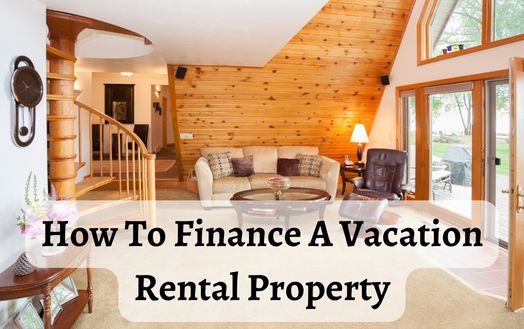How To Finance A Vacation Rental Property
Are you dreaming of owning a vacation rental property but unsure how to make it a reality? Look no further! In this article, I will guide you through the exciting world of how to finance a vacation rental property.
With the right knowledge and strategies, you can turn your dream into a profitable investment.
When it comes to financing your vacation rental property, there are several loan options available that cater specifically to investors like yourself. From traditional mortgages to specialized investment loans, the choices can be overwhelming. But fear not! I will break down each option for you and explain their benefits and drawbacks, allowing you to make an informed decision that suits your needs.
Additionally, we’ll explore various investment opportunities in the market today, so you can choose the one that aligns with your goals and maximizes your returns.
How To Finance A Vacation Rental Property
To capitalize on a vacation rental property investment, you’ll need to investigate financing options. Vacation rental property financing maximizes returns by leveraging your investment.
Financial institutions offer vacation rental loans. These loans are for buying and renovating vacation rentals. Vacation rental loans work like mortgages, but with some differences. Vacation rental properties usually require 20–30% down payments. Loan amounts and interest rates are also based on rental income. Lenders may require location, property type, and projected occupancy rates.
To finance a vacation rental, you need good credit and enough income to cover personal expenses, vacancies, and maintenance. Lenders will review your credit score, debt-to-income ratio, employment stability, and assets. Financial documentation will speed up the application process.
Vacation rental financing is crucial. Vacation rental loans can help you buy and renovate your property. After covering financing options, let’s discuss vacation rental-specific loans.
Loan Options

Loans can help finance a vacation rental. Vacation rental property loans have several options. Three loan options can help you finance your dream vacation rental:
- Conventional Mortgage: This is the most common type of loan used by homeowners and real estate investors alike. With a conventional mortgage, you can obtain funding from banks or lending institutions based on your creditworthiness and the value of the property. It typically requires a down payment ranging from 10% to 25%, depending on your financial profile.
- Home Equity Loan or Line of Credit (HELOC): If you already own a primary residence or another property with substantial equity, tapping into that equity through a home equity loan or line of credit can be an attractive option. This allows you to borrow against the existing value of your property and use those funds towards purchasing your vacation rental property.
- Vacation Rental-Specific Loans: Some lenders offer specialized loans tailored specifically for financing vacation rental properties. These loans may have unique terms and conditions designed to accommodate the needs of short-term rentals, such as flexible repayment plans based on seasonal income fluctuations.
Explore these loan options to find a vacation rental property investment loan that meets your needs.
Investment Opportunities
Discover vacation rental opportunities and a potential investment goldmine. Vacation rental properties offer financial returns and the chance to enjoy paradise.
Vacation rentals have increased demand for unique and comfortable accommodations worldwide. You can capitalize on this growing market by investing in a well-located, well-designed vacation rental property.
Vacation rental properties can yield high returns. Well-managed vacation rental properties can generate rental income immediately, unlike traditional real estate investments. More people are choosing vacation rentals with home-like amenities over hotels because they want privacy and space. Leveraging this demand can boost profits and wealth.
You can finance a short-term rental investment property. Vacation rentals can be profitable, so lenders offer specialized loan programs. Depending on your finances, you can choose from traditional mortgages or loans for vacation homes or investment properties.
Vacation rental properties allow you to earn passive income while using them for your own vacations. Short-term rentals are a growing market with great potential. You can confidently start this profitable venture by carefully choosing a location and securing suitable financing. Let’s discuss how to afford your dream vacation home!
Vacation Home Financing

Flexible financing makes buying your dream vacation home easier. Vacation rental properties can be financed in many ways.
Vacation home financing lets you buy a second home without depleting your savings. With the right property loans and financial planning, you can rent out your vacation home and reap the benefits.
Traditional mortgage loans can finance vacation homes. Vacation rental mortgage loans are available just like primary residence mortgages. These loans require a down payment of 10%–20% of the property’s value. Although interest rates are higher than for primary residences, they are still competitive enough to make this an attractive option.
Cash-out refinancing is another popular vacation rental property financing method. This strategy lets you use equity from another property to fund your new investment. You can buy your dream vacation home by refinancing your mortgage at today’s low rates and taking out more cash.
Private or hard money lenders can also provide vacation rental property financing. Short-term lenders offer higher interest rates and easier qualifications than banks. These loans offer fast funding without credit score requirements but have higher upfront costs.
Finding the right vacation home financing option is crucial. Consult real estate investment experts or reputable lenders who understand vacation rental property financing.
Credit Score Considerations
Your credit score matters when financing your dream vacation home. Credit scores affect loan eligibility and interest rates. Credit scores indicate debt management and payment ability to lenders.
Before financing a vacation home, you must improve or maintain your credit score. You need good credit to buy a vacation home. Higher credit scores improve loan approval rates and terms.
High-credit borrowers are less risky, so lenders offer competitive financing. Thus, you must check your credit report for errors that could lower your score. When investing in real estate, improving your credit score is worth the time and effort. Start by paying off all debts on time. Low credit utilization can also boost your score. Keep your credit-to-use ratio below 30%. These steps will improve your financial profile and increase your chances of getting good financing.
Maintaining or improving your credit score is crucial when financing a vacation home. Understanding how lenders evaluate creditworthiness can help you get affordable financing for that dream vacation rental property without sacrificing quality or location.
Let’s talk about vacation rental income next.
Rental Income Potential

When calculating ROI, maximize your dream getaway home’s earning potential. Rental income is a major source of income for your vacation rental property. Analyze your property’s rental income potential before financing it.
Bookings will help you decide if the investment is financially viable, plan for future expenses, and estimate cash flow. Location determines rental income potential. Consider vacation destinations or short-term rental hotspots. Prime locations attract more guests and command higher rental rates, increasing revenue. Examine market trends and seasonal variations to determine peak demand and price increases.
It’s also important to evaluate tourist attractions. Views, private pools, hot tubs, and proximity to tourist attractions attract more guests and justify higher rates. To learn what travelers want, research nearby vacation rentals.
Professional photography and marketing can increase bookings and rental income. High-quality photos of your property’s highlights will attract guests. To reach more vacationers, use Airbnb or VRBO.
Your vacation rental property can earn a steady income through strategic location selection, appealing amenities, and effective marketing. Analyzing these factors during financing will help you set realistic investment returns and plan for future growth. Considering how these earnings build property equity, it helps secure your financial future.
Property Equity
Consider how property equity will grow over time to maximize your dream getaway home investment. Vacation rental properties can generate passive income and build wealth as they appreciate.
Four reasons why vacation rental financing requires property equity:
- Increased borrowing power: As your vacation rental property increases in value, so does the equity you’ve built up. This increase in equity gives you greater borrowing power, allowing you to access additional funds if needed. Whether it’s for renovations, expansion, or unexpected expenses, having this extra financial flexibility can be invaluable.
- Potential for higher returns: Property equity growth can significantly impact your overall return on investment (ROI). When it comes time to sell your vacation rental property, the accumulated equity can result in a substantial profit. This potential for higher returns makes financing a vacation rental property an attractive long-term investment strategy.
- Collateral for future investments: Owning a vacation rental that has built up significant equity can serve as valuable collateral when seeking funding for future real estate investments. Lenders often view properties with high levels of equity as less risky and may offer more favorable loan terms and interest rates.
- Wealth accumulation: Building property equity is one way to accumulate wealth steadily over time. By leveraging the increasing value of your vacation rental property, you can create a solid foundation for financial stability and potentially open doors to other opportunities.
Before moving on to “vacation rental loans,” it’s important to understand how property equity affects financing options for buying and managing these properties without taking unnecessary steps toward our dream of owning a successful vacation rental business.
Vacation Rental Loans

Vacation rental loans are designed for people who want to buy a property to rent out as a vacation rental. Lenders have tailored loan products to investors’ needs as vacation rentals grow in popularity. These are effective ways on discovering how to finance a vacation rental property.
Vacation rental loans help borrowers buy vacation rental properties by taking into account potential rental income, location desirability, and creditworthiness.
Vacation rental loans allow investors to leverage their assets or cash flow without tying up all their capital in one investment property, allowing those without enough savings or equity in their primary residence to buy a vacation rental property. Owning a successful vacation rental, whether it’s a beachfront condo or a cozy mountain cabin, can be lucrative and rewarding for investors.
Let’s explore another way to finance your dream vacation: buying instead of renting!
Buying A Vacation Home
Why not buy a vacation home and enjoy all its comforts and freedom for the perfect getaway?
Three reasons to buy a vacation home:
- Income Potential: One of the biggest advantages of owning a vacation rental property is the income potential it offers. By renting out your property when you’re not using it, you can generate extra cash flow that can help offset the costs of owning and maintaining the property. With platforms like Airbnb and VRBO, it’s easier than ever to market your vacation home to potential renters and maximize your rental income.
- Flexibility: Owning your own vacation home gives you the flexibility to travel whenever and wherever you want without having to worry about booking accommodations or finding availability. You have complete control over when you use the property, allowing you to plan spontaneous getaways or long vacations without any hassle.
- Long-Term Investment: A well-chosen vacation home can also serve as a long-term investment that appreciates in value over time. Popular tourist destinations often experience growth in both tourism demand and real estate prices, making them ideal locations for purchasing a vacation property. If you decide to sell in the future, you may be able to make a substantial profit.
If you’re looking for ways to finance a vacation rental property, buying a vacation home may be a good option because it offers income potential, flexibility, and investment potential.
Next, we’ll discuss how to find the right property without breaking the bank or sacrificing quality.
Finding The Right Property

If you’re looking for the perfect vacation, consider renting a vacation home with all the amenities and freedom you want.
When investing in a vacation rental property, you need to find a desirable location with all the amenities and attractions that will attract renters. Look for areas with high demand for vacation rentals and consider factors like proximity to popular tourist destinations, local attractions, and financing options.
After finding the perfect vacation rental property, it’s time to explore financing options. Traditional mortgage loans are available for second homes, but they often require higher down payments and interest rates than primary residences. Other options include home equity loans or lines of credit, which allow you to tap into your home equity, or specialized lenders who specialize in vacation rental financing.
Finding the right property is crucial to financing your dream vacation rental property. Consider location, amenities, and suitability for potential renters when making your decision. Once you’ve found the right property, explore different financing options, such as traditional mortgage loans, home equity loans, or specialized lenders.
Let’s look at the loan approval process and how it can make your dreams come true.
Loan Approval Process
After finding the perfect vacation rental, it’s time to navigate the loan approval process and turn your dreams into reality. The loan approval process involves working with home lending institutions to secure a loan that meets your needs and allows you to buy the property of your dreams.
With the right knowledge and preparation, you can own a vacation rental after this exciting and nerve-wracking process. To begin the loan approval process, research and compare home lending institutions. Look for lenders who specialize in financing vacation rental properties or have experience with unconventional investments. They will understand the unique challenges and potential benefits of this type of investment.
After finding potential lenders, discuss your goals and get pre-approved. Lenders will look at your credit score, debt-to-income ratio, employment history, and the property’s income potential when you apply for a conventional loan for a vacation rental property. Be prepared to provide tax returns, bank statements, and proof of income from existing tenants.
The loan approval process takes time, but once approved, you’ll be one step closer to owning your dream vacation rental property. After learning how vacation rental loans are approved, we can explore down payment options to complete our financing plan without missing out on opportunities.
Down Payment Options

As I mentioned earlier, the loan approval process is crucial to financing a vacation rental property. Once approved, you’ll need to decide how much you can put toward the down payment. Your mortgage terms and financing depend on your down payment.
Let’s discuss the different down payment options for financing a vacation home. A conventional down payment requires 20% of the purchase price, which avoids private mortgage insurance (PMI) and may lower monthly payments. However, saving up such a large sum of money can be difficult for many people.
Another option is to use equity from existing properties or borrow against retirement savings for a down payment. Some lenders may offer vacation rental property-specific programs with lower down payments.
To summarize:
- Consider making a conventional down payment of 20% to avoid PMI and potentially enjoy lower monthly payments.
- Explore alternative options like using equity from other properties or borrowing against retirement savings.
- Look for specialized programs offered by lenders that cater specifically to financing vacation rental properties.
- Assess your financial situation and choose the down payment option that best suits your needs and long-term goals.
After exploring down payment options to finance a vacation rental property, let’s focus on working with lenders and navigating their requirements and processes.
Working With Lenders
Let’s explore how to work with lenders to finance a vacation home. Lenders can provide you with a home mortgage to buy the property you want.
Start by researching lenders and their offerings. Look for those who specialize in real estate investment or have experience providing loans for vacation homes. Talk to multiple lenders to understand their terms and conditions. Each lender may have different requirements and interest rates, so compare your options before making a decision.
After choosing a lender, be prepared to present your financial information and documentation. Lenders will usually require proof of income, tax returns, bank statements, and other relevant documents to demonstrate your ability to repay the loan. They will also check your credit score and history.
After submitting all paperwork, the lender will evaluate your application based on your creditworthiness, debt-to-income ratio, down payment amount, and property value. If approved, they will provide loan terms, including interest rate options and repayment schedules.
Now that we know how to work with lenders to finance our vacation home, let’s manage rental expenses profitably.
Managing Rental Expenses

To maximize profits, you must carefully manage your vacation rental property’s expenses.
Four rental cost management strategies:
- Budgeting: Start by creating a detailed budget that outlines all of the expected expenses related to your vacation rental property. This should include mortgage payments, property taxes, insurance costs, maintenance fees, utilities, and any other recurring expenses. By having a clear understanding of what you need to spend each month, you can better plan for the future and avoid any unexpected financial surprises.
- Regular Maintenance: It’s important to stay proactive when it comes to maintaining your rental property. Regularly inspect the property for any potential issues or repairs that may need attention. Taking care of these maintenance tasks promptly can help prevent larger problems down the line and save you money in the long run. Additionally, investing in preventative measures like regular cleaning services or pest control can help keep your property in top condition and minimize potential damages.
- Cost-effective Furnishing: When furnishing your vacation rental property, aim for a balance between quality and cost-effectiveness. Look for durable furniture and appliances that’ll withstand frequent use from guests without breaking the bank. Consider purchasing items in bulk or taking advantage of discounts from wholesalers to save money on furnishings. Remember that while it’s important to create an inviting atmosphere for guests, overspending on unnecessary decor or extravagant amenities might not provide a significant return on investment.
- Energy Efficiency: Implementing energy-efficient practices can significantly reduce utility costs associated with running your vacation home. Consider installing energy-saving light bulbs, programmable thermostats, low-flow faucets and showerheads, as well as insulation improvements where necessary. These upgrades not only lower monthly bills but also appeal to environmentally conscious travelers who appreciate sustainable properties.
To maximize ROI and ensure long-term success in this competitive market, you need to increase bookings and guests.
Maximizing ROI
In the competitive vacation rental market, it’s important to maximize your return on investment. With the right strategies and a little creativity, you can make your vacation rental property profitable.
Think about what makes your location special and capitalize on it. Whether it’s breathtaking views, access to outdoor activities, or exclusive partnerships with local businesses, these added features can attract more guests and command higher rental rates.
Optimizing your pricing strategy is crucial to maximizing ROI. It’s important to strike a balance between attracting guests with competitive rates and ensuring profitability. Conduct regular market research to stay up-to-date on vacation rental industry trends and pricing. Consider dynamic pricing, where rates fluctuate based on demand and seasonality.
Professional property management can boost your ROI by minimizing vacancies, optimizing bookings, and providing excellent guest experiences.
Finally, don’t underestimate the power of online reviews in maximizing ROI for your vacation rental property. Positive reviews build trust among potential guests and encourage them to book. Actively seek feedback from guests after their stay and address any issues. Consider offering discounts or special perks for future bookings to encourage reviews.
Financing a vacation rental property requires careful consideration of how to maximize ROI in an increasingly competitive market. Offering unique amenities, optimizing pricing strategies, investing in professional management services, and prioritizing positive online reviews are all effective ways to achieve this goal. By staying innovative and constantly seeking ways to improve guest experiences, you can ensure that your vacation rental property becomes profitable.
Final Thoughts
In conclusion, financing a vacation rental property can be difficult, but with the right knowledge and resources, it’s possible. Individuals can find the best financing option on how to finance a vacation rental property exploring different loan options and investment opportunities.
When looking for financing, credit scores and down payment options can greatly impact the loan terms and conditions. Working with lenders who specialize in vacation home financing can also be beneficial, as they have experience in this niche market and can guide and support borrowers throughout the process.
Vacation rental property owners should also carefully track expenses and implement strategies to attract guests and increase bookings to ensure their property is financially viable and profitable.
Financing a vacation rental property takes careful planning and financial management, but it can be rewarding for both personal use and investment.
Frequently Asked Questions
How Can I Find Reliable Property Management Services For My Vacation Rental Property?
I found reliable vacation rental property management by researching and using innovative methods.
First, I used Airbnb and HomeAway to find reputable property management companies with good reviews. These platforms connected me with vacation rental experts. I also joined vacation rental forums to get advice from other hosts.
Finally, I used the latest automation tools to streamline property management processes and ensure reliability. I found reliable vacation rental property management by embracing innovation and exploring various resources.
Are There Any Tax Implications Or Advantages Associated With Owning A Vacation Rental Property?
Vacation rental properties have tax benefits. First, vacation rental property owners can deduct mortgage interest, property taxes, insurance, maintenance costs, and even travel expenses related to managing their property. These deductions can offset rental income and reduce taxable income.
Owning a vacation rental property may also allow you to claim depreciation deductions, but there are rules and restrictions, so consult a tax professional.
However, if you rent out your vacation home for more than 14 days a year but use it for less than 14 days or 10% of total rental days (whichever is greater), you must report your rental income and expenses on your tax return. This means keeping track of all rental income and documenting deductible expenses throughout the year.
In conclusion, owning a vacation rental property can have its share of tax implications and complexities, but understanding these factors can help maximize your financial benefits while ensuring IRS compliance. So if you’re considering investing in real estate or already own one, don’t forget to explore the potential tax advantages and consult with an expert who can guide you.
What Are Some Common Challenges Or Pitfalls To Be Aware Of When Financing A Vacation Rental Property?
There are several issues to consider when financing a vacation rental. Finding a lender who understands vacation rentals is one of the biggest challenges. Many traditional lenders are unfamiliar with the concept and may not finance this type of property.
Because vacation rentals are riskier, lenders may find it harder to finance them. To determine how much you can borrow and whether rental income will cover your mortgage payments and expenses, you must research local rental market trends and occupancy rates.
Finally, a contingency plan and funds for maintenance, repairs, and vacancies are essential for managing cash flow during low occupancy or unexpected expenses.
Overall, financing a vacation rental property requires careful planning but can lead to exciting opportunities in the growing short-term rental market.
How Can I Effectively Market And Promote My Vacation Rental Property To Attract Potential Guests?
I use Instagram and Facebook to showcase my vacation rental property’s stunning views, luxurious amenities, and personalized touches to attract guests.
I engage my audience with captivating captions and interactive content like virtual tours and behind-the-scenes looks to build excitement and intrigue around my rental. I also work with local influencers and travel bloggers to boost its visibility and credibility.
I maintain a stellar reputation by constantly monitoring online reviews and promptly addressing any concerns or suggestions from previous guests. Through creativity, engagement, and responsiveness, I attract potential guests to my vacation rental property for a unique experience.
What Are Some Important Factors To Consider When Setting Rental Rates For My Vacation Rental Property?
Several factors should be considered when setting vacation rental rates.
First, analyze market demand in your area and find out what similar properties are charging to set competitive rates that attract guests.
Consider your property’s unique features and amenities. If you have a beautiful view or luxurious amenities, you can charge higher rates. If your property is smaller or lacks amenities, you may need to lower your rates.
Finally, don’t forget to include cleaning fees and taxes when setting rental rates. By carefully considering these factors, you can set rental rates that cover expenses and make a profit for your vacation rental business.











